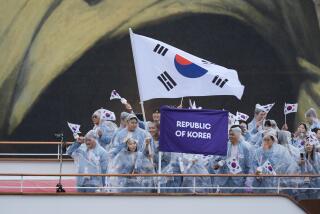Samaranch’s March Madness May Be Big Dance for Koreas
- Share via
In what could turn out to be a defining moment of sports serving diplomacy, the International Olympic Committee has invited the two Koreas to march together behind the Olympic flag in the opening ceremony at September’s Sydney Games.
Typically reclusive North Korea has not issued a response to the notion, suggested in a May 25 letter from IOC President Juan Antonio Samaranch to both countries. The issue is on the agenda for a historic summit set to begin in two weeks in Pyongyang, the North Korean capital, between the leaders of the two countries.
And South Korean officials indicated Thursday they are amenable--using the sort of language that suggests something may be afoot.
S.J. Yoon, a spokesman at Blue House, the South Korean equivalent of the White House, said in a telephone interview: “It is quite clear that South Korea, we have always wanted to have this kind of cooperative relationship.”
Added Kim Un Yong, the IOC’s delegate in South Korea who has represented that nation’s interests in international sports for years, “There is a great possibility this will happen.”
Kim, who recently was elected to South Korea’s national assembly and who has a close relationship with South Korean President Kim Dae Jung, said a march together with the North at the Olympic Games would be a “great historical moment.”
If the two Koreas do march together on Sept. 15 in Sydney, it will once again serve as a vivid reminder of the potent role sports can assume on the international stage--a role that has been magnified since Ping-Pong diplomacy helped open U.S. relations with China in the 1970s.
It also will illuminate a facet of Samaranch’s leadership of the IOC. Atop the IOC for 20 years, he has consistently sought to advance the notion, no matter how utopian it might seem, of world peace and brotherhood.
Last week, for example, the IOC cleared the way for athletes from East Timor to compete at the Sydney Games.
East Timor, which voted for independence from Indonesia last year, is now under United Nations administration and does not yet fulfill the criteria for Olympic recognition.
Nonetheless, the IOC voted to allow its athletes to compete in white uniforms free of any national identification. The athletes will march in the opening ceremony behind the Olympic flag. Officials said East Timor may send three or four athletes--to compete in boxing and track and field.
Another example: in a couple weeks, Samaranch is due to travel to Israel, to meet there with senior Israeli and Palestinian officials.
And another: Last year, Samaranch reopened the rebuilt Zetra Olympic Hall in Sarajevo, which was destroyed by Serb gunners during the 1992-95 Bosnian War, saying he hoped it would “contribute to the process of reconstruction of Bosnia and reconciliation between its people.”
Sarajevo played host to the 1984 Winter Games before it was decimated by war.
Samaranch has long taken a special interest in the Korean peninsula.
He coaxed more than 160 nations to the 1988 Seoul Games--thereby ending the era of the Olympic boycott, which marked the 1984 Games in Los Angeles and the 1980 Games in Moscow.
In recent years, the IOC has on a number of occasions donated large shipments of rice to North Korea.
Writing last week from the IOC’s meetings in Brazil, Samaranch sent similar letters to North and South Korea expressing his support for the historic summit between North Korea’s leader, Kim Jong Il, and South Korea’s Kim Dae Jung.
Scheduled to begin June 12, the summit is the first between leaders of the two nations since the Korean peninsula was divided after World War II.
As part of his letter, Samaranch proposed that athletes from the two nations walk together in Sydney. In the letter to the South Koreans, obtained by The Times, he suggested that athletes from South and North march under the Olympic flag, followed by the flags of their nations.
He said South and North would still compete independently at the Games. Nonetheless, he said, the act of marching together “will not only contribute to peace in the region but will also allow joint training and mutual cooperation in many areas.”
Evoking real echoes of Ping-Pong diplomacy, he added, “A joint team in the table tennis world championships next year can also be considered. You can open many doors to many other possibilities.”
Sepp Blatter, the head of soccer’s worldwide governing body, FIFA, had said a few weeks ago that North Korea’s involvement in the first World Cup finals in Asia is still a possibility. The 2002 World Cup is scheduled to be co-hosted by South Korea and Japan.
“After the summit there will be hopefully cooperation in many fields,” Kim Un Yong said Thursday. “Sports will be one field. This will be one of the possibilities we can discuss.”
More to Read
Go beyond the scoreboard
Get the latest on L.A.'s teams in the daily Sports Report newsletter.
You may occasionally receive promotional content from the Los Angeles Times.






